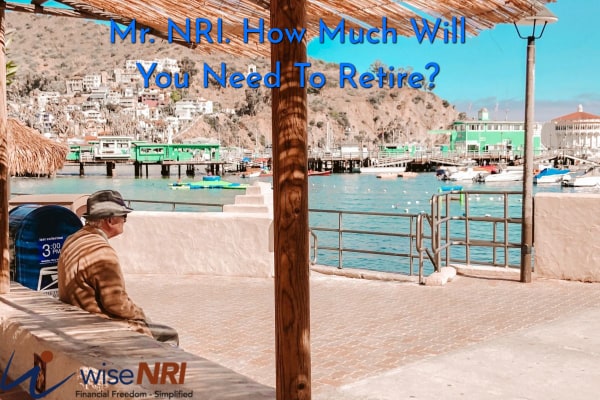When we see retirees, we see all types of lifestyles they lead. A few make the most of their golden years and enjoy life to the fullest. Some barely maintain the same living standard as they did earlier.
But most retirees live frugally so that their retirement funds outlive their and their spouses’ lifetimes. Many retirees also face the nightmare where they find their savings depleted in the last leg of their journey.

The problem accentuates for NRIs, who wish to retire in India, among familiar faces and surroundings. The main reason for retiring in India is the currency differential and dirt-cheap availability of many services here.
Must Read- Why Should NRIs Save For Early Retirement
Why NRIs Required Retirement Corpus?
Retirement planning for NRIs is a serious personal as well as financial matter, affecting their lifestyle in the twilight years. NRIs have to make more effort as they have been long cut-off from the ground realities in India – healthcare costs, cost of living, and taxation rules.
Many NRIs are HENRYs – High Earners, Not Rich Yet. Their median incomes are higher than the general population in their host country, but a high-maintenance lifestyle reduces their savings and investments to retire there.
Typically, HENRYs are in their late 40s or early 50s and have recently realized that retirement requires deliberate and careful planning. By retiring in India and converting the same corpus into INRs, it not only becomes substantial, but sufficient too.
Factors to Consider for How Much Retirement Corpus Is Enough?
NRIs need answers to these questions:
- Can the retirement corpus at least sustain the current lifestyle in the host country? Or would you be forced to retire in India?
- What is the time period your corpus is supposed to last?
- How much needs to be set aside for medical bills?
- How Much Will NRI Need To Retire?
- How much will hobbies and newfound interests cost?
- How will inflation, exchange rate, and market fluctuations affect you?
- What are the tax implications of retirement savings in the host country of residence, and treatment of the corpus there and when you bring it to India?
- What investment avenues are available for you – international and Indian – as an NRI and is your portfolio secure against multiple risks?
Must Read- How to Retire Rich
Following factors require for How Much Will You Need To Retire in India?
Where to Retire?
Retirement destination must be a choice and not forced upon you, because of the paucity of funds. If you stay back because of your family, or business links, that is a different reason. But life is what it is and the majority of NRIs are forced to come back to India.
Even in India, the disparity is huge, and retiring in a tier 2 city like Jaipur, Kochi, or Lucknow may cost you almost half of a metro like Delhi or Mumbai. Going to a smaller town or village may require only a fraction of the corpus needed for retiring in a metro.
When to Retire?
Because of better healthcare and quality lifestyle, many people in their 50s and 60s are in the prime of their health. They can earn very well into their 70s or even much later.
Retiring from a job is linked to your age but retiring from a business or profession is entirely up to you. Even after retiring from a regular job many people pursue financially rewarding assignments in an advisory capacity.
Therefore, retirement age must be rationally chosen considering all the benefits you will get when you continue to work – personal, professional, social, cognitive, physical, and financial.
There are many opportunities for retiree NRI–returnees in India as well, and you can slowly and gradually slip into your full-time retirement.
Check – NRIs & Their Foreign Pension Fund Issues
Life expectancy
Notwithstanding the COVID-19 pandemic, the average life expectancy has increased dramatically over the last few decades, thanks to better healthcare and access to nutrition. Living longer means, you will be surviving on your retirement corpus longer.
And with each passing year the chances of contracting a critical illness increase, thereby increasing the medical expenses manifold. You need corpus big enough to last past your life and have sufficient room for such emergencies.
Goals
Your post-retirement goals can include children’s or grandchildren’s education and marriage, bequeathing an heirloom to the family, planning vacations, and catering to long-standing desires and interests.
With a retirement financial plan, you can provide for all these goals as well as assign priorities to them.
Read – NRI retire early using the FIRE Method
Exchange Rate
Probably the exchange rate is now in your favor, but if your retirement is a few years away, you never know what may unfold and tilt the balance against you. To hedge against such externalities, you should start investing in INR denominated investments in India.
Expenses and Inflation
The inflation that we really pay for is usually much higher than the reported aggregate numbers. As a cautious approach keep your inflation expectations – at least for medical and comfort-related expenses – closer to two digits while making a retirement plan. There will be many new expenses that you don’t incur today when you retire, so keep a healthy margin of contingency funds.

Must Read – Financial Freedom for NRI – Myth and Reality
Calculating Target Retirement Corpus
With the help of a financial planner, you can put all these factors in a mixer and come up with a practical range for your retirement nest egg value. The lower band will represent the absolute minimum you need to cross, while the upper band would represent the desired level of the corpus.
Anything over and above the upper band is always a welcome bonus. Once you have arrived at the final value of the target corpus, the financial planner can help you sift through your current investments and suggest a course correction to reach the upper band of the range.
Let’s take an example where we show how this can be done.
Read – How NRIs can complete KYC for investing in Mutual Funds in India?
Assumptions:
- Current age 50 years – so 10 years to retirement.
- You already have a home in India.
- Your running monthly expense would be Rs. 1-lakh at the time of retirement, to maintain the current standard of living.
- The overall inflation is assumed to be 7% – not all items have the same rate.
- Post-tax fixed income returns of 4%.
- The life expectancy of 90 years for you and your spouse each.
- The total retirement period would be at least 35 years, 30 for the elder partner and 35 for the younger of the two.
Hard numbers:
Annual expenses: Rs. 12-lakhs in year 1 increasing by 7% a year.
Annual Medical Expenses: Rs. 5-lakhs from 60 to 70, Rs. 10-lakhs from 70-75 years, Rs. 15-lakhs from 75-80, and Rs. 20-lakhs thereafter.
Annual Income: Only from fixed-income instruments at 4% (post-tax).
Minimum Corpus Target: Rs. 4.25-crores for 17 lakhs at 4% in year 1.
Desired Corpus: Rs. 5.5-crores for 22-lakhs at 4% in year 1.
Manna: Rs. 7.5-crores for 30-lakhs at 4% in year 1.
In the last two scenarios, any extra income can be reinvested in the nest egg, to help it grow more. This can help you meet any unforeseen medical or other needs.
If you are looking for proper retirement planning to live the life you deserve – TALK TO US
Way To Go
Whatever your actual corpus needs are, you must not put them in the back seat and take control of your future today. A financial planner can evaluate your current portfolio, its IRR, time left for retirement and suggest if you need to stay the course or invest more aggressively to reach your desired target.
Let’s take another example and assume your present corpus is Rs. 1-crore and you need Rs. 6.5-crores more in 10 years to reach the manna stage. For this you will need to invest close to:
- 4.10-lakhs a month at 4% IRR
- 3.50-lakhs a month at 6% IRR
- 2.95-lakhs a month at 8% IRR
Conclusion
Actual monthly investment – their avenues and, therefore, returns – would depend on your risk profile, current disposable income, and potential for income growth from the main earning activity.
We cannot be too precise about the rates and amounts here as we are looking into the distant future, and anything can happen there. Therefore, you need to be prepared to make adjustments to the plans and expectations as well.
The sooner you plan, decide, and start investing for retirement, the better. Careful planning would be the strong foundation on which you can build your dream retirement home. Ask the right questions and work with your financial advisor to signoff from the hustle of work-life with dignity.
Hope you have a good idea about How Much Retirement Corpus Is Enough for NRI. If you have a question about How Much Will NRI Need To Retire in India? add them to the comment section.

My age 63 years and how much funds require for retairement
How much money is needed for early retirement
I am 45 with two kids in school I am planning to retire in 2 years max. need to understand how much corpus do i need to retire
For retairement how much funds req for peacefully life
We are retired. I have an OCI card and wife does not but born in India. Planning to spent about 9 months of a year in India. May be Goa or along beach area in south. Wanted to learn about the move etc.